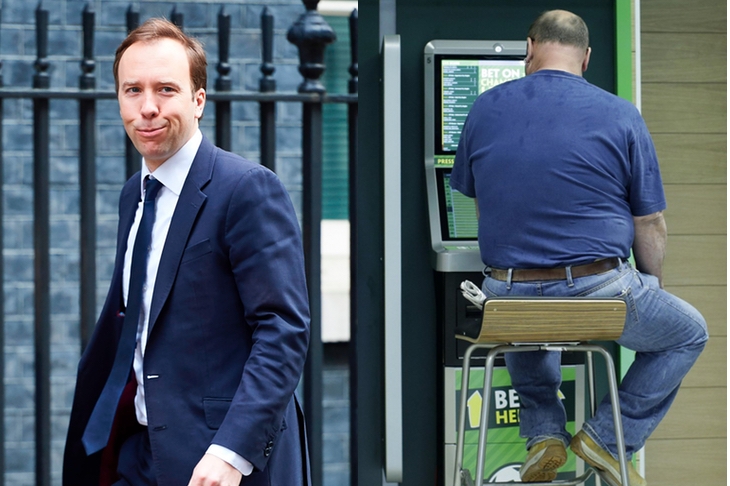It’s good to see that for all their bickering over Brexit and war of words over austerity, the Tories and Labour are firmly united on one point of view: that the poor must be saved from themselves. That the wretched are incapable of making sensible choices and therefore their betters must step in and make choices on their behalf. Behold the great bipartisan belief of 21st-century British politics: paternalism.
How else do we explain the cross-party effort to reduce the maximum bet one can place on a fixed-odds betting terminal — or FOBT — from £100 to £2? The government unveiled this state-mandated reduction in how much of our own money we can put inside a fruit machine this morning. The language ministers are using to justify these bureaucratic controls on dumb people’s desire to gamble is deeply patrician. These machines ‘prey on some of the most vulnerable in society’, said culture secretary Matt Hancock, as if the machines were monsters and ordinary people unthinking creatures easily sucked into a vortex of dependency.
Labour MP Carolyn Harris, who has campaigned against FOBTs, says they are ‘toxic machines’. The press talks about FOBT in language straight out of The Day of the Triffids. ‘They spread misery up and down the country and prey on some of the poorest and most vulnerable people in Britain’, said the Mirror. And they do best in poor areas, where people are ‘unable to resist the lure of [these] highly addictive [machines]’, the Mirror says. Patronising gits.
The image we are left with is of hapless hard-up people being lured into betting shops by the lights of these machines whereupon they gamble away their weekly wage. This is a caricature, and a pretty grotesque one. To begin with, for all the talk of these machines ‘spreading’ through poor areas, research by the Local Data Company found that only 17 percent of Britain’s betting shops are in very deprived areas; 62 per cent are in areas with lower than average levels of deprivation. I know people who frequent betting shops, mainly to bet on horses, and they will occasionally spend 10 or 20 quid on an FOBT if they’re bored. I expect that’s how the majority of FOBT-users engage with these machines.
Yet that hasn’t halted the media elite’s creepy obsession with the wicked hold the machines have over ‘the poor’. A few years ago the Guardian sent a reporter to Slough — you know things are bad when the Guardian is willing to enter Slough — to investigate FOBTs. She watched in horror as people’s ‘£20 notes disappeared into them’. Yeah, well, I’ve watched in horror as impeccably middle-class people have queued for hours to get into some hip new restaurant and proceeded to spend £40 on glorified hotdogs and dirty chips. We all do stupid things with our money.
The clampdown on FOBTs is justified with grand words, though the words change depending on who you’re talking to. For Tories, battling these machines is about defending community life. For Corbynistas, it’s about standing up to big business, in this case the gambling industry. I’m not buying either side. Let’s be really honest about this: the new thirst to restrict certain forms of gambling is straight out of the Victorian playbook of paternalism.
Victorian moralists likewise wanted to protect ‘the poor’ from their own self-destructive instincts. As one historical study puts it, they wanted to ‘protect the working classes from their presumed lack of self-control’. A magazine called Moral Reformer said gambling was an ‘unmingled evil’ and new laws were needed to guard the poor man ‘against his own avarice and gullibility’. The same nasty elitism drives much of the anti-FOBT agitation. This is why they talk so much about poor areas, even though betting shops tend to be in non-poor areas: because they see the less well-off as bereft of the self-control enjoyed by the rest of us and thus easy ‘prey’ for machines.
Is the gambling industry a nice industry? I’m sure it isn’t. Do some people develop bad gambling habits? Absolutely, and if they need help, they should get it. But do we really need state diktats telling us what we can do with our own money and what vices we should and shouldn’t pursue? No. It’s interfering, condescending, and will do nothing, precisely nothing, to fix the deep-seated, structural economic problems in certain parts of Britain. This new movement of plummy moralists and bourgeois Corbynistas who want to use bureaucracy to save the poor from their own avarice and gullibility is a menace to serious politics.







Comments